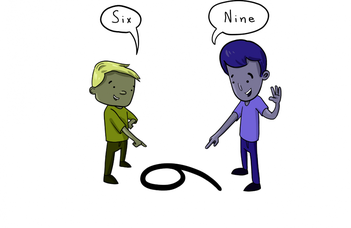Taking others’ perspectives is already fast in children

How deeply do our perceptions of the knowledge of our peers inform our interactions with others? In one of our studies, we looked for evidence that peer categorisation, the grouping of others according to their knowledge, influences how quickly and spontaneously we are able to assess what they see or perceive in a situation. This is most important when the experience of others differs from what we experience. The present study was carried out with 8-year-old children, as they could understand the task, and handle numbers and number names more confidently than younger children. They were given the simple task of deciding whether the number name they were hearing was corresponding to the number they were seeing.
The task was as follows: participants were presented with the numbers 0, 8, 6 and 9 alternating on a monitor screen. The participants heard number names and the task was to indicate by the press of a button whether the number they heard and the number they saw were the same. In some cases, they were seated opposite to someone else who was also completing the same task. In another part of the task, they were alone. Note that if we see an 8, it will mean the same number to the person sitting opposite us, but if we see a 6, it will have a different meaning to the person sitting opposite us: it will appear to them as a 9. In this situation, we can explore whether, in such a simple decision task, the observer hesitates, and reaction time slows down as our partner observes a different meaning. Our previous studies have indicated that children as young as 8 years old can read the perspective of others, which can be seen in their slowing down in the above situation, when the symbol appears to their partner with a different meaning. In this study, we wanted to build upon our previous findings and see whether the participants' perception of the other's perspective is influenced by assumptions of the knowledge base on the other person's side. We were also interested in whether shared group membership could influence participants’ behaviour during such a task.
In one of our groups, children completed the task presented with their own classmates, where the other child was either in the same class with them or not, so group membership was random, (i.e., minimal group membership). In another group, the second person either shared cultural group membership with the participant (i.e., spoke same mother tongue) or was a member of an outgroup, as could be inferred from their accent (i.e., cultural group-based group membership). While spontaneous perspective taking was not affected by minimal group membership, it was attenuated by accent. In other words, children's decision making was slowed if the other person belonged to a different culture. These results led us to conclude that peer categories, which indicate a partner's knowledge, play a role in reading others' opinions.
In a further study, we investigated pespective-taking in Indonesian children. Click here to read the summary.
